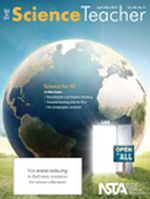
"When teaching scientific argumentation, selecting the wrong topic can impair — rather than increase — student understanding." That was the message of four members of NCSE's staff, Minda Berbeco, Mark McCaffrey, Eric Meikle, and Glenn Branch, in their commentary "Choose Controversies Wisely," published in the April/May 2014 issue of The Science Teacher.
Because interest in teaching scientific argumentation is burgeoning, the commentary observed, "It's tempting to choose controversial topics to teach the skill of arguing from evidence. Controversies, after all, are what people argue about." But they also pose a risk: "Choosing the wrong controversial topic can result in a net loss ... in student understanding."
Five criteria for assessing whether a controversy is appropriate for a science classroom were presented. Among them: "If a controversy is presented as a scientific controversy, it should be a genuine scientific controversy," with climate change and evolution identified as two topics that are socially controversial but not scientifically controversial.
The commentary then addressed the question of whether to discuss non-scientific controversies in a science class at all. Without offering a definitive answer, Berbeco and her colleagues urged the importance of explicitly contrasting scientific argumentation "with the freewheeling, undisciplined, and often antagonistic argumentation of ordinary life."
Finally, a few further pitfalls in introducing students to scientific argumentation were mentioned, warning not only of counterproductive approaches like staging debates but also of attempts to exploit the increasing interest in teaching scientific argumentation in the service of undermining the teaching of evolution and climate change.
